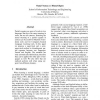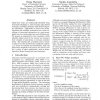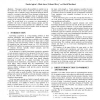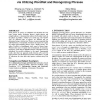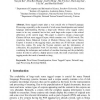150 search results - page 22 / 30 » Four Methods for Supervised Word Sense Disambiguation |
105
Voted
ACL
2006
15 years 3 months ago
2006
Partial cognates are pairs of words in two languages that have the same meaning in some, but not all contexts. Detecting the actual meaning of a partial cognate in context can be ...
104
click to vote
COLING
2000
15 years 3 months ago
2000
Multi-word terms are traditionally identified using statistical techniques or, more recently, using hybrid techniques combining statistics with shallow linguistic information. Al)...
114
Voted
ECAI
2000
Springer
15 years 6 months ago
2000
Springer
This paper explores the possibility to exploit text on the world wide web in order to enrich the concepts in existing ontologies. First, a method to retrieve documents from the WWW...
130
click to vote
SIGIR
2004
ACM
15 years 7 months ago
2004
ACM
Noun phrases in queries are identified and classified into four types: proper names, dictionary phrases, simple phrases and complex phrases. A document has a phrase if all content...
145
click to vote
LKR
2008
15 years 3 months ago
2008
Sense tagged corpus plays a very crucial role to Natural Language Processing, especially on the research of word sense disambiguation and natural language understanding. Having a l...
